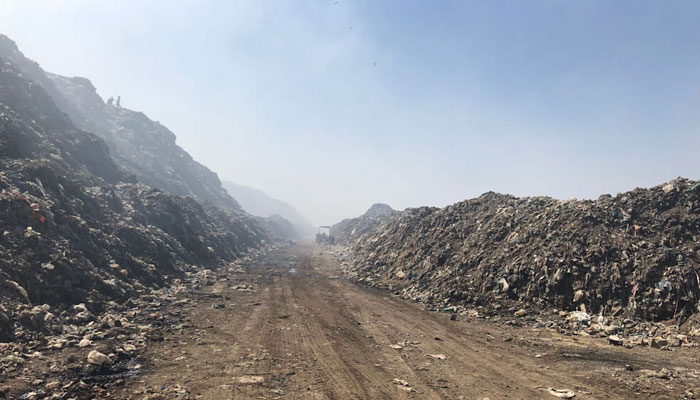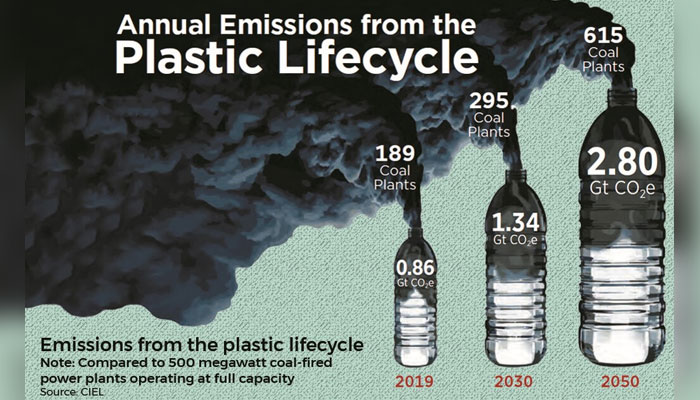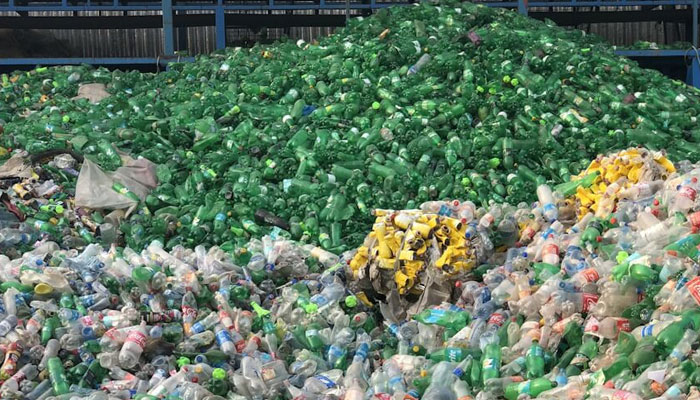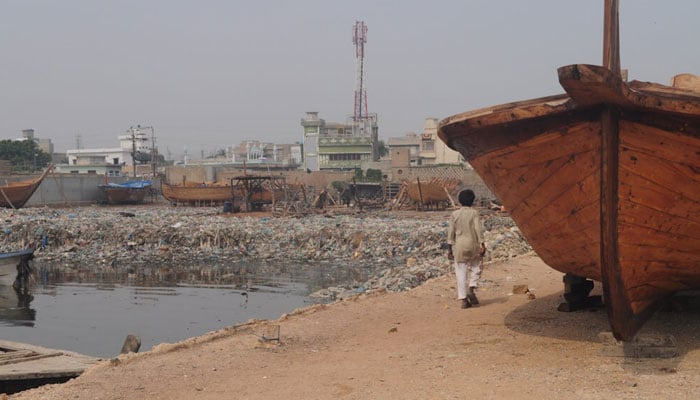Karachi has been experiencing more intense and uncertain monsoon rain for the past few years which frequently causes flooding. A prime reason has been the rising incidence of plastic use and, consequently, plastic waste in the city’s drainage .system. Despite this knowledge, there is no stopping the people of Karachi from reaching out for single-use bags.
The increased rainfall is, of course, linked to climate change; the plastic choking the drains does not help. As Dr Sardar Sarfaraz, chief meteorologist of Pakistan Meteorological Department, says, “the flooding is exacerbated by unplanned urbanisation and poor drainage system.” Not all are convinced.
Mansoor Ahmed Khan, 47-year-old scuba diver who has led teams to clean the seabed, believes it is unfair to blame plastics for Karachi’s water-logging. “It’s the city’s inefficient waste collection and management system,” he points out.
Plastic has everything to do with climate change. It is not just an eyesore contributing to biodiversity loss and pollution; it is also a key driver of the climate crisis, experts say. Plastic use is threatening the global temperature rise, given that more than 93% originate in fossil fuels derived through carbon-intensive activities of extraction, refining, and manufacturing, explains Sahab Alam Khan, senior officer, circularity and sustainability section, WWF-Pakistan.
Adds Shiza Aslam, research head, Circular Plastic Institute at Karachi School of Business and Leadership, “Plastics, like any other material, cause emissions throughout their life cycle and the value chain. The challenge is its fuel base origin and quantum.”
Pakistan’s total contribution to the global emissions is less than 1%; besides plastics, this would be from transport, power plants, cement and fertiliser factories, and agriculture. The exact contribution of plastics to the emissions from Pakistan is unavailable but its role in impending storm water drainage is there for all to see.
If all the plastic waste of Pakistan — approximately 3.3 million tonnes — is collected, it will equal two K2 mountains, the world’s second highest mountain, stated the UNDP. And if nothing is done, it may reach 12 million tonnes.

Indus, the second most plastic-polluted river in the world, carries 40% of plastic to the Arabian Sea, according to a World Bank study in 2022. Three-fourths of this is low-density polyethylene used in grocery and garbage bags, juice containers, cling wrap; hard-to-recycle plastics such as sanitary napkins, diapers, face masks, bandages, syringes; multi-layered packaging which is light-weight and easy to throw, but difficult to collect.
The high-density polyethylene used in plastic bottles, jugs, shampoo bottles, bleach bottles, cutting boards as well as polyethylene terephthalate (PET) used in carbonated drink bottles and artificial fibres for blankets, bed sheets, comforters, carpets, and upholstery comprised only 6%, mostly because PET has a higher recycling value for waste-pickers.
Yet, a study on PET waste in ten cities of Pakistan found that Karachi generated the highest at 5,551,992 kilos per month — nearly one-fourth of the total 22,332,636 kilos.
Karachi’s failed waste management
Karachi, a city of 20 million people, generates between 10,000 and 12,000 tonnes of waste daily, according to the Sindh Solid Waste Management Board (SSWMB), of which nearly 20% is plastic waste. From empty plots to roadside litter, water bodies and landfills, plastic waste is everywhere.
“We cannot pick it up from all over Karachi, in areas that are under the jurisdiction of other land-owning agencies which have their own collection and disposal system,” defends Tariq Nizamani, executive director of the SSWMB. Additionally, hospital waste disposal is the responsibility of the Karachi Municipal Corporation while that of industrial waste is of various industrial estates — typically the problem of multiple agencies which do not coordinate with each other.
“Karachi lacks a well-knitted city administration,” explains Farhan Anwar, the CEO of Urban Collective, “Solid waste management works like a chain; one weak link and the entire chain collapses.” According to this study, poor infrastructure management combined with “bureaucratic hurdles, lack of urban planning, inadequate waste management equipment and lack of public awareness” results in plastic pollution in water bodies and landfill sites.
Also, the legislation on plastic pollution is limited to polyethylene bags and is poorly implemented, noted the study.
Incinerating plastics
If plastic production is problematic, its disposal through incineration is worse because it contributes to substantial greenhouse gas emissions and toxic pollutants. Globally, incineration accounted for 70% of total end-of-life emission in 2019; Pakistan, let alone Karachi, does not have credible data.
When inert at a landfill, plastic can take between 20 to 500 years to decompose, if at all, during which there are emissions such as methane and ethylene, this study shows. Methane is a major cause of climate change. Plastic waste enters the oceans and causes havoc in the marine ecosystem.
On June 16 to 17 last year, when the severe tropical Cyclone Biparjoy in the Arabian Sea made landfall, the sea threw out tonnes of debris including rotting wood, dead aquatic animals, shells of clams and mussels, and a large amount of plastic waste.
Moazzam Ali Khan recalls, “The quantity of plastic littered on Karachi’s Clifton beach was unbelievable.” According to a study by WWF-Pakistan, where he is an advisor, plastic accounts for 65% of total waste ending up on beaches throughout the year. The study showed that 55 billion plastic bags are used in the country with an expected annual increase of 15%. In short, there will be more plastic in the coming years even as its waste management falters.

Scuba divers like Mansoor Ahmed Khan say that divers routinely come across polystyrene cups and plates, plastic forks and spoons, plastic bags and bottles, and “thousands of flip-flops” besides plastic shopping bags and yards of discarded fishing nets. He, with a team, used to clean the waste but they have given up.
Oceans have the largest pool of carbon on the planet with some reports saying it is 60 times more than in the atmosphere but this is drastically diminished by the increasing density of microplastics. Also, the plastic floating on the sea surface becomes colonies for bacteria which reduce oxygen for other organisms below. The Arabian Sea may be a prime sink for CO2 in the region but plastic waste in it poses a serious problem.
Choked mangroves
Karachi’s coastline and creeks have a lush spread of 2,000 hectares of mangrove forest. These too are imperilled by plastic waste choking their roots. Architect Tariq Alexander, documenting the ruthless cutting of mangroves since 2011 is pained at this.
From the 6,00,000 hectares along Sindh’s coastline in the early 20th century, mangroves declined to barely 46,000 hectares in the mid-1980s but, thankfully, increased again to about 2,00,000 hectares. But Alexander mourns the cutting down of tall mature trees.
“Their growth is slow because of the lack of sweet water; the trees growing in major inlets like Manora channel, Korangi and Phitti creeks, with a balance of sea and non-saline water, are being cut for development and wood,” he says. “The plastic waste damages the network of soil’s fungus, the mycelium. The microplastics are ingested by fish and shellfish, consequently, also by birds.”
And because mangroves are a powerful carbon sink, the impact of plastic on the mangrove forests is a major contributor to climate change, he warns. “Reducing the mangrove cover and not cleaning the city’s sewage, solid waste and plastic will have a detrimental impact on the health of Karachi’s citizens.”
Micro-level management is key
Managing plastic waste, especially in developing nations with limited infrastructure, remains a challenge. The best option is community-led waste-management at the micro level, according to Dr Mehr Nigar, assistant professor, Department of Mechanical and Aerospace Engineering at Islamabad’s Air University.
She has been working closely with primary school children, including marginalised communities, since 2019 in the ‘Saaf Mohalla, Saaf Pakistan’ (Clean Neighbourhood, Clean Pakistan) project.

Hands-on educational programmes and continuous community engagement are key to behavioural changes, she says. “Our emphasis on sorting at source may have diverted over 600 kilos of recyclables from open burning but, more importantly, it instilled a sense of responsibility within the community,” she adds. Such small-scale initiatives can shape a sustainable community on plastics.
People like her point to not the use of plastic but the rampant use of single-use plastic as a cause for concern because the dismal recycling rates and unchecked consumption of these have exacerbated the plastic pollution.
A way out of plastic mess
In the Gilgit-Baltistan region, in the Karakoram-Hindu Kush mountains, the administration is managing plastic waste by raising awareness and enlisting multinational companies. “We started with an awareness campaign using media platforms,” said Shehzad Shigri, director of the Gilgit-Baltistan Environmental Protection Agency.
Alongside, interest-free loans of 5,00,000 rupees were disbursed to five women-led organisations to make reusable cloth bags which were sold to brands. Another set of loans was given to plastic wholesalers to turn it into biodegradable material and to set up the manufacturing plants. The Agency provided a one-year subsidy on electricity too.
Besides, it joined hands with the local police to enforce the ban on single-use plastic. “In ten districts in the region, we managed to achieve some success. Gilgit district alone had 50% success, we hope to eliminate single-use plastic from our region by 2025,” says Shigri.
Micro-level planning and management helps. At its four entry points by road and two airports bringing in tourists, the administration has replaced plastic bags with cloth bags charging a refundable 50 rupees per bag. “We started this at Deosai and Khunjerab national parks,” says Shigri.
For plastic bottles and packaging waste, the government’s Gilgit-Baltistan Waste Management Company has been working with Nestlé, the multinational food and beverages company, since 2021, which installed three compressing and baling machines for recycling bottles. Over 2,700 tonnes of packaging waste has been segregated and collected.
“This will minimise plastic waste from ending up in water bodies downstream,” says Sheikh Waqar Ahmad, Nestlé’s head of corporate affairs and sustainability.
MNCs Coca Cola and Pepsi have also signed MoUs with the Gilgit-Baltistan government to set up similar units. However, single-use plastic continues. “It is used by the vegetable, fruit and meat sellers. We have, so far, not succeeded in enforcing the ban,” rues Shigri, “But we will find a way.”
Recycling rewards but rethink plastics
A multi-stakeholder group of well-known packaging companies, MNCs and non-governmental organisations has formed a collect and recycle (CoRe) alliance to aim at 100% recyclable packaging by 2025. Anwar of Urban Collective argues, in this oped, that if all plastic was not considered a waste, it could become rewarding.
Reuse, recycling and segregation at household level helps in reducing its collection and disposal. “Interesting opportunities open up for start-ups and entrepreneurship where community-based organisations and the private sector can become part of the circular economy cycle creating jobs and businesses, making for a healthier, environment-friendly city,” Anwar wrote. However, he told Question of Cities: “This will require a totally new architecture of governance with enabling space for informal and private sectors.”
Globally, Greenpeace is calling for a reduction of at least 75% of plastic production by 2040, urging nations to look at the plastic crisis through a climate lens. Using more recycled plastic means less emissions and reduction of plastic waste.
“Recycling plastics reduces GHG emissions by reducing the demand for new plastics,” said Babar Aziz Bhatti, director of Green Earth Recycling, one of Pakistan’s largest recycling companies which makes outdoor furniture, manhole covers, door frames, and roofing sheets using “green plastic wood” produced from plastic scrap.
Bhatti admitted that just 3% of plastic waste is used by the recycling industry — a drop in the ocean. There’s also scepticism of companies “greenwashing their businesses”.

Plastic experts say it is time to rethink the relationship with plastic. The perfect solution would be zero-plastic waste culture but it is unrealistic. As WWF’s Moazzam Ali Khan says, “It’s difficult to eliminate plastic from our lives.” Experts like him suggest “reduction in production as the only way out”. That too is a tall order.
The lack of data is also hurting the cause. There are no local, provincial or national goals to reduce plastic use and pollution, no data on production and waste, says Dr Nigar.
The best solutions offered are reactionary bans, which are rarely successful or sustainable. Studies too recommend investing in data collection, monitoring, and reporting with the long-term objective of a national integrated data collection and sharing platform/dashboard.
Data and policy with clear goals will become important as countries work on the first-ever global treaty to tackle the plastic crisis and aim to end plastic pollution by 2040. The circular economy where plastic is reused, recycled, and responsibly managed to lower emissions is the way ahead.
Without data on solid waste management and plastic in particular, authorities in Karachi — and Pakistan — will find it challenging to frame policies, foster public awareness and behavioural change, encourage private investment, and take effective decisions on reducing waste.
Zofeen Ebrahim is an independent journalist. She posts on X @zofeen28
This reported essay first appeared in the online journal Question of Cities and was part of the work done for the QoC-CANSA Fellowship 2023-24. The original can be found here.

